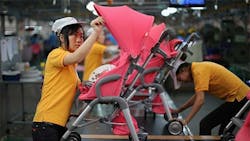China's Growth in Manufacturing Hits Eight-month Low
China's manufacturing growth skidded to an eight-month low in November, an official survey showed Monday, fuelling speculation authorities will take further steps to stimulate the world's second-largest economy.
China's official Purchasing Managers' Index (PMI) released by the National Bureau of Statistics came in at 50.3 last month, lower than the 50.8 recorded in October and the weakest since a similar 50.3 reading in March.
"The decline in the PMI was broad-based, led by output and new orders," Nomura economists said. "The weaker PMI data implies that growth momentum remained weak in November," they said, adding: "This helps explain the People’s Bank of China’s decision to cut benchmark interest rates" last month.
China's central bank on November 21 surprised economists by cutting benchmark interest rates for the first time in more than two years, in a move interpreted as an attempt to shore up flagging growth. The PBoC lowered its one-year rate for deposits by 25 basis points to 2.75% and its one-year lending rate by 40 basis points to 5.6%.
The move came after a string of disappointing data showed the Chinese economy is struggling with not just stalling factory growth, but other problems including soft exports and a weakening property market.
Authorities had for months utiliszd various kinds of limited stimulatory measures such as targeted cuts in bank reserve requirements -- aimed at freeing up funds for lending -- and a cash injection into the country's five biggest banks for re-lending.
More Rate Cuts Expected
Separately, a closely watched private survey of manufacturing conditions was confirmed to have fallen to a six-month low showing stagnation.
British bank HSBC's final PMI for November came in at the 50.0 breakeven point dividing expansion and contraction, the bank said, matching a preliminary figure released last month. The result, compiled by information services provider Markit, was lower than October's 50.4 and the weakest reading since May's 49.4.
"Domestic demand expanded at a sluggish pace while new export order growth eased to a five-month low," said Qu Hongbin, HSBC's chief China economist.
Qu added that the PBoC rate cuts will aid in stabilizing investment in property and manufacturing in the months ahead. "We continue to expect further monetary and fiscal easing measures to offset downside risks to growth," he added.
China's economy expanded 7.3% in the July-September quarter, down from 7.5% in the previous three months and the slowest since 2009 at the height of the global financial crisis.
A slowdown in China's huge property sector has been weighing on overall growth, with broader worries about the health of the country's financial sector also a cause for concern.
China's housing prices fell on a monthly basis for the seventh straight month in November, a survey showed Sunday.
The average price of a new home in China's 100 major cities was 10,589 yuan (US$1,720) per square meter in November, down 0.38 percent from October, the independent China Index Academy said.
Julian Evans-Pritchard, China economist at Capital Economics, warned, however, against overconfidence in policy support to underpin growth.
"The recent cut in the benchmark rates will do little to boost economic activity unless followed by a loosening of quantitative controls on lending, which policymakers will remain cautious about given concerns over mounting credit risk," he said in a note.
-Kelly Olsen, AFP
Copyright Agence France-Presse, 2014
About the Author
Agence France-Presse
Copyright Agence France-Presse, 2002-2025. AFP text, photos, graphics and logos shall not be reproduced, published, broadcast, rewritten for broadcast or publication or redistributed directly or indirectly in any medium. AFP shall not be held liable for any delays, inaccuracies, errors or omissions in any AFP content, or for any actions taken in consequence.
